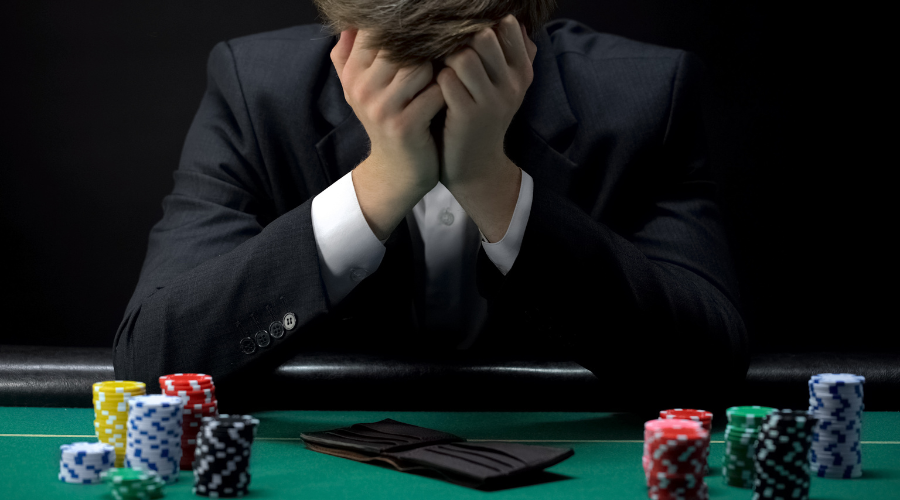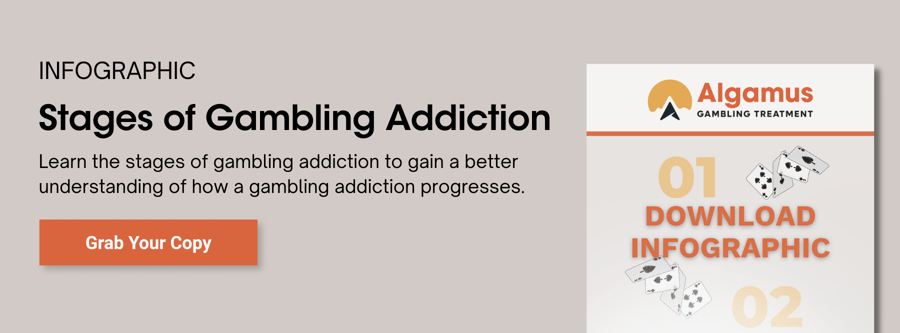By Rick Benson
Poker can be a fun and exciting game, but for some, it can quickly turn into an addiction. The thrill of the game can lead to compulsive gambling, which can have negative physical and psychological effects on an individual. In this blog post, we will discuss the warning signs of poker addiction and how it begins. We will also look at who is at risk of developing a gambling addiction and the available treatment options. Additionally, we will examine the long-term consequences of gambling addiction and its impact on family and friends. If you or someone you know is struggling with a gambling addiction, this blog post is for you. Read on to learn more about spotting poker addiction and what you can do to help overcome it.
What are the warning signs of poker addiction?
Warning signs of poker addiction can manifest in various ways. Firstly, an individual may experience an intense preoccupation with poker, constantly thinking about the game, strategies, and past hands. They may prioritize poker over other responsibilities, such as work, relationships, or personal obligations. Additionally, a person addicted to poker may exhibit an inability to control their gambling behavior, continuously increasing the time and money spent on playing. They may become restless, irritable, or anxious when attempting to cut back or stop playing. Financial troubles, such as excessive debt or borrowing money to fund their poker habit, can also be indicative of addiction. Neglecting personal hygiene, experiencing mood swings, isolating oneself from family and friends, and displaying dishonesty about their gambling habits are other potential warning signs. If these warning signs are present, it is crucial to seek professional help to address and manage the addiction effectively.
How does gambling addiction begin?
Gambling addiction typically begins with an individual's initial exposure to gambling activities. It could start innocently as a form of entertainment or a casual pastime. For some, the thrill of winning or the escape from reality that gambling provides can be enticing. Over time, however, certain factors can contribute to the development of addiction. One such factor is the neurochemical response that occurs when gambling, as the brain releases dopamine, a neurotransmitter associated with pleasure and reward. This creates a pleasurable sensation, reinforcing the desire to continue gambling. Additionally, individuals may be more susceptible to addiction due to genetic, environmental, or psychological factors. Certain personality traits, such as impulsivity or sensation-seeking tendencies, can also increase the risk of developing a gambling addiction. As gambling becomes more frequent and excessive, it can lead to financial, emotional, and interpersonal consequences, further fueling the addictive cycle. The progressive nature of addiction makes it crucial to recognize the warning signs early and seek appropriate support and treatment.

What are the physical effects of poker addiction?
There is known to be physical effects associated with prolonged and intense engagement in the game. One physical consequence is the potential for chronic stress and anxiety. The constant pressure and uncertainty in poker can lead to elevated levels of stress hormones, which can negatively impact the body over time. Chronic stress can contribute to a range of health problems, including high blood pressure, cardiovascular issues, weakened immune system, and sleep disturbances. Additionally, poker addiction may lead to sedentary behavior, as individuals spend long hours sitting at tables or in front of screens. Lack of physical activity can result in weight gain, musculoskeletal problems, and reduced overall fitness. Poor nutrition may also accompany poker addiction, as individuals may prioritize playing over healthy eating habits, leading to irregular meals or reliance on unhealthy snacks. Furthermore, the stress and financial strain associated with gambling can contribute to unhealthy coping mechanisms such as smoking, excessive alcohol consumption, or drug use. It is essential for individuals struggling with poker addiction to seek support not only for their psychological well-being but also to address and mitigate potential physical health risks.
What are the psychological effects of compulsive gambling?
Compulsive gambling can have a range of negative psychological effects. It may cause financial stress and feelings of hopelessness, as well as anxiety and depression. Relationships can suffer when gambling takes priority. In severe cases, it can even lead to suicidal thoughts.
How do gambling and substance abuse relate to each other?
Gambling can cause mood swings, anxiety, and depression. It may also lead to financial stress and relationship problems. Addiction can develop due to the thrill of gambling. Professional help and support groups are available for those struggling with compulsive gambling.
Who is at risk of developing a gambling addiction?
While anyone can develop a gambling addiction, certain factors can increase an individual's susceptibility to this condition. Firstly, individuals with a family history of gambling addiction may be at a higher risk due to genetic and environmental factors. Additionally, people with certain personality traits, such as impulsivity, sensation-seeking tendencies, or a need for excitement, may be more prone to developing a gambling addiction. Mental health conditions, such as depression, anxiety, or substance abuse disorders, can also contribute to vulnerability to gambling addiction. Social factors, such as being surrounded by peers or family members who gamble excessively, can influence an individual's likelihood of developing an addiction. Furthermore, easy access to gambling activities, whether in physical casinos or online platforms, can increase the risk of addiction. Financial instability or a history of financial problems may also play a role, as gambling can be seen as a way to escape or solve financial difficulties, leading to a destructive cycle. Recognizing these risk factors and taking proactive measures to promote responsible gambling behaviors is crucial in mitigating the risk of developing a gambling addiction.
How can you help someone with a gambling addiction?
Helping someone with a gambling addiction requires a comprehensive and supportive approach. Here are some steps you can take to assist someone struggling with a gambling addiction:
- Educate yourself: Learn about gambling addiction, its causes, and its consequences. Understand the signs and symptoms so that you can better support the individual.
- Be non-judgmental and empathetic: Approach the person with empathy, understanding that addiction is a complex issue. Avoid blaming or shaming them, as this may push them away and hinder their willingness to seek help.
- Encourage open communication: Create a safe and non-threatening environment where the person feels comfortable discussing their addiction. Encourage them to express their concerns, fears, and experiences related to gambling.
- Offer support and encouragement: Let the person know that you are there to support them throughout their recovery journey. Encourage them to seek professional help and let them know that seeking assistance is a sign of strength, not weakness.
- Encourage professional help: Suggest that they seek professional assistance from a counselor, therapist, or support group specialized in addiction. These professionals can provide guidance, therapy, and strategies to overcome the addiction.
Remember, professional help is crucial for individuals dealing with gambling addiction. Encourage the person to reach out to addiction counselors, therapists, or support groups that can provide specialized assistance.
What are the available addiction treatment options?
When supporting someone with a gambling addiction, encourage them to seek professional help while providing emotional support. Avoid enabling behaviors and learn about available resources. It's important to understand that recovery is a journey, and relapses may occur, but it's possible to overcome addiction with the right support.
What are the long-term consequences of gambling addiction?
Gambling addiction can have profound long-term consequences that extend beyond the immediate financial losses. One significant consequence is the severe financial strain that individuals may experience due to excessive gambling. Mounting debts, bankruptcy, and loss of assets can have long-lasting effects on their financial stability, impacting their quality of life and future opportunities. The strain on relationships is another consequence, as the addiction can lead to trust issues, broken bonds, and a breakdown in family and social connections. Gambling addiction may also contribute to mental health problems such as depression, anxiety, and even suicidal thoughts or actions. Neglected physical health can arise from the neglect of self-care, including poor nutrition, lack of exercise, and sleep disturbances. Legal issues may also arise if the individual turns to illegal activities to fund their gambling habit or engage in fraudulent behavior. Ultimately, the long-term consequences of gambling addiction can deeply impact an individual's overall well-being, including the financial, emotional, social, and physical aspects of life. Seeking professional help and support is essential to address and mitigate these consequences and work towards recovery and a healthier future.
What is the success rate of gambling addiction treatment?
The success rate of gambling addiction treatment can vary depending on several factors, including the individual's level of commitment, the severity of the addiction, the treatment approach used, and the support system available. It is important to note that gambling addiction, like other forms of addiction, can be challenging to overcome, and relapses may occur.
While specific success rates can be difficult to measure accurately, studies have shown that treatment interventions, such as cognitive-behavioral therapy (CBT), motivational interviewing, and support groups like Gamblers Anonymous, can be effective in helping individuals recover from gambling addiction. These interventions aim to address the underlying factors contributing to the addiction, develop coping strategies, and provide support.
Success in gambling addiction treatment often involves a combination of professional help, personal commitment, ongoing support, and lifestyle changes. Maintaining long-term recovery requires ongoing efforts to prevent relapse and develop healthier habits. Building a strong support network, attending regular therapy sessions, and practicing self-care are essential components of sustaining recovery.
It is crucial to approach treatment with realistic expectations and understand that recovery is a continuous process. Success rates can improve significantly with comprehensive treatment, individual determination, and ongoing support, but each person's journey is unique, and the outcomes may vary.

Are there any legal consequences of compulsive gambling?
Compulsive gambling can result in financial, legal, and emotional difficulties. It may even lead to criminal charges like fraud or embezzlement. In some states, individuals or their loved ones can request court-ordered treatment for gambling addiction. Seeking professional help is crucial to avoiding negative consequences and managing the addiction effectively.
Do support groups help in overcoming gambling addiction?
Yes, support groups can be highly beneficial in overcoming gambling addiction. Support groups provide a safe and non-judgmental environment where individuals can share their experiences, challenges, and successes related to gambling addiction. They offer a sense of community and understanding among peers who have gone through similar struggles.
Support groups, such as Gamblers Anonymous (GA), follow a 12-step program similar to Alcoholics Anonymous (AA). These programs provide a structured approach to recovery, encouraging individuals to admit their powerlessness over gambling, seek support, make amends for their actions, and work towards a gambling-free life. The group setting allows participants to learn from one another, gain insights into their addiction, and develop coping strategies for managing urges and triggers.
In support groups, individuals find empathy, encouragement, and accountability. Sharing stories and listening to others' experiences can provide hope and inspiration for recovery. Members can receive practical advice, guidance, and emotional support from people who have faced similar challenges and successfully managed their addiction.
Attending support group meetings on a regular basis can contribute to the ongoing maintenance of recovery, provide a sense of belonging, and reinforce the commitment to abstain from gambling. Additionally, participating in support group meetings fosters a supportive environment where individuals can share their experiences, gain valuable insights from others, and develop strategies to overcome gambling addiction.
While support groups alone may not be sufficient for everyone, they can be a valuable component of a comprehensive treatment plan that may include therapy, counseling, and other interventions.
How can you prevent relapse after completing treatment?
Preventing relapse after completing treatment for gambling addiction requires a multifaceted approach. Firstly, maintaining a strong support system is crucial. Stay connected with individuals who understand your journey and can offer encouragement and accountability. Engaging in ongoing therapy or support groups can provide valuable guidance and reinforcement. It's important to identify and avoid triggers that may lead to gambling urges, whether they are certain environments, people, or emotional states. Developing effective coping strategies, such as engaging in alternative activities, practicing stress management techniques, and seeking healthy outlets for emotions, is essential. Creating a relapse prevention plan with a therapist or counselor can help identify warning signs and establish a plan of action. Practicing self-care, including prioritizing physical and mental well-being, managing finances responsibly, and staying focused on long-term goals, can significantly reduce the risk of relapse. Lastly, being vigilant, honest with oneself, and willing to seek help if needed are critical in maintaining recovery and preventing relapse.
What is the impact of gambling addiction on family and friends?
Gambling addiction can deeply affect the loved ones of the addict, causing financial hardship, emotional turmoil, and relationship issues. Friends may feel powerless in supporting their addicted friend. It is crucial for family and friends to seek help and resources to cope with the impact of gambling addiction on themselves.
Conclusion
To summarize, gambling addiction is a serious condition that can cause physical, emotional, and financial damage to an individual and their loved ones. It is essential to recognize the warning signs of poker addiction early on and take necessary steps towards recovery. Treatment options include therapy, support groups, and medication.
However, the success rate of treatment varies from person to person. It is crucial to have a strong support system during the recovery process and take preventive measures to avoid relapse. If you or someone you know is struggling with gambling addiction, don't hesitate to Share this blog with someone who may need it or reach out to our counselor for personal assistance.




